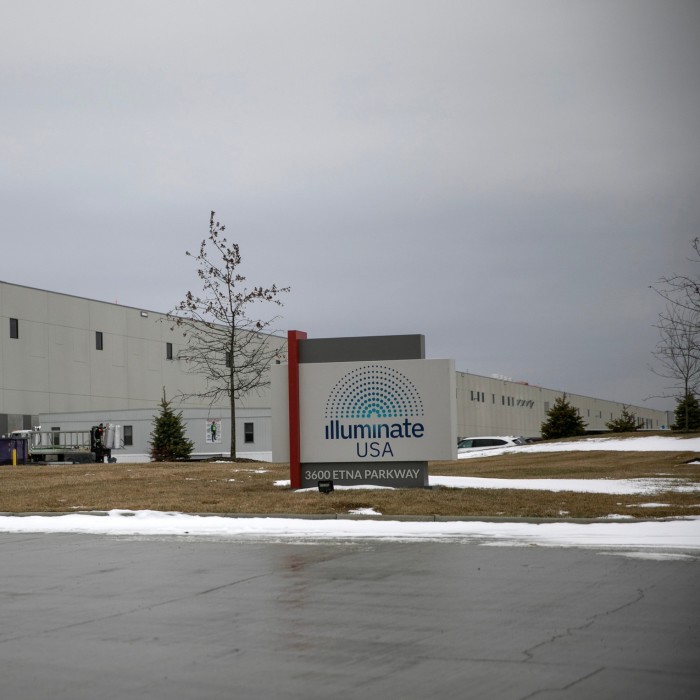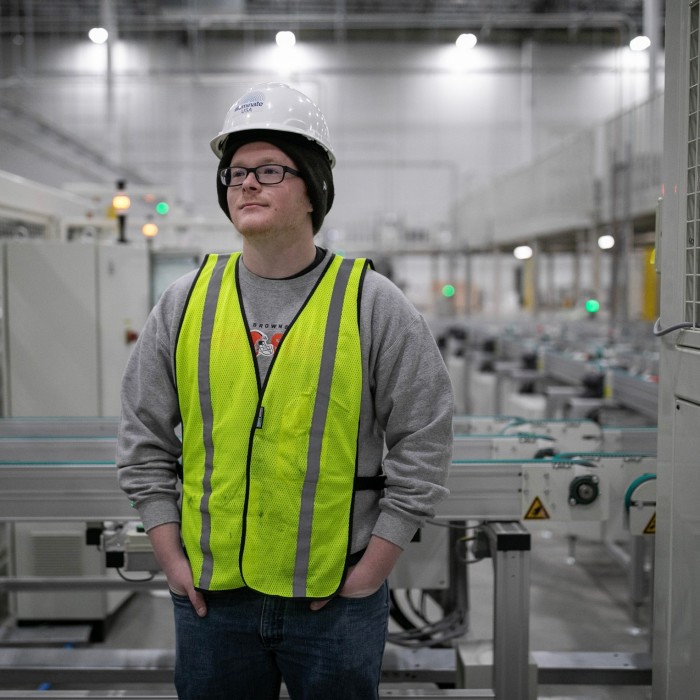In the sleepy Midwestern town of Pataskala, Ohio, a 1 million-square-foot factory built on former farmland is marked with a sign: Illuminate USA.
The utility building is expected to begin production this month as one of the largest solar panel manufacturers in the United States. At full capacity, the $600 million plant will employ more than 1,000 workers, boosting the economy of the rural community on the fringes of Columbus, Ohio’s state capital.
The factory is an example of the type of project President Joe Biden is touting in his reelection campaign, bringing manufacturing onshore and transforming the United States into a leader in the technologies needed to decarbonize energy systems.
“When a company like Illuminate USA comes into our area, people really think, ‘Wow, this is great, this is amazing.’ Not only do these jobs pay well, but they’re also jobs that make me feel good,’” said Angela Carnahan of Ohio Means Jobs, an employment agency.
Not everyone is so enthusiastic. Illuminate USA is a joint venture between Invenergy, the largest private U.S. developer of renewable energy, and Longi, the world’s largest solar panel manufacturer. The latter partner has aroused suspicion locally because it is based in China.
“Pataskala is now infected with the cancer known as the Chinese Communist Party,” Jerry Forns, a resident, said at a city council meeting in January. “Does anyone really think the CCP cares that this country was founded on Judeo-Christian principles?”


Resistance to the project highlights the conundrum facing U.S. policymakers trying to build a national supply chain for solar energy – the fastest-growing source of new generation on the U.S. power grid – in a country that lacks the ability to China in technology. According to the International Energy Agency, China produces more than three-quarters of all panels and an even larger share of its inputs, such as wafers.
Kurt Wagner, chief financial officer of Illuminate USA, told the Financial Times that the partnership with Longi offers the US the opportunity to “really catch up in terms of technology.”
“A company in China will give us the technology and really help us get a foothold in manufacturing here,” he said.
The Inflation Reduction Act Biden signed into law in 2022 provided billions of dollars in subsidies to produce clean energy technologies domestically and deploy them quickly. The incentives support the purchase of local products, but foreign manufacturers can receive tax credits if they open factories in the United States.
“The bottom line is that these Chinese companies are among some of the best manufacturers in the world. . . Isolating U.S. factories from Chinese suppliers is virtually impossible at this point,” said Pol Lezcano, senior associate at consultancy BloombergNEF.
Longi is not alone: Some of China’s largest solar panel makers, including Jinko Solar and Trina Solar, have announced plans to build factories in the United States as Washington reviews tariffs on solar components and prepares to impose fines on companies that have evaded duties assembling solar products in South-East Asia, including on Longi’s subsidiary Vina Solar.
Licking County, which includes Pataskala, is at the forefront of White House efforts to attract more high-tech manufacturing to the United States, with chipmaker Intel planning to build $20 billion worth of semiconductor factories there. dollars. The development helped push the unemployment rate down to a record low of 2.7%.
As for the Illuminate USA facility, an opposition group called Not in Pataskala has warned of a “red menace” and adopted a logo with an X behind a hammer and sickle.

State and local officials have reiterated that Illuminate USA is an American company and have denied allegations of ties to the Chinese government. Chicago-based Invenergy holds a majority stake, owns the building and will be the primary customer for the panels. The company received $4 million in incentives from the state of Ohio and a 15-year tax break on property improvements.
“They have pitchforks, T-shirts and posters. They don’t want to listen to reason,” Pataskala Mayor Mike Compton said of factory opponents. Illuminate USA marks the largest manufacturing investment in the rural city’s history.
Jim Murphy, president of Invenergy, said the factory represents an “opportunity” to “provide a growing market” for panels made in the United States.
“Illuminate USA works on so many levels. It meets growing demand, strengthens U.S. know-how in solar manufacturing, and creates hundreds of good-paying American jobs,” Murphy said.
Other China-linked clean energy investments have faced setbacks, including two planned battery plants in Michigan and a wind farm in Texas. The concern has also spread to Washington: Republican Senator Marco Rubio and Representative Carol Miller introduced legislation in December that would prevent tax credits for Chinese companies.


“Every American should pray that this bill passes through the House and Senate and is signed into law by the president,” Pataskala resident Judy Kathmire said during the city council meeting.
Ashley Schapitl, a spokeswoman for the US Treasury, said that foreign investments are “subject to rigorous safeguards to ensure national security”. Chinese companies accounted for just 15% of all U.S. investments in solar manufacturing after the IRA was approved, or 10% excluding Longi’s investment in Illuminate USA, a senior administration official said.
The IRA was ushering in a “renaissance of America’s manufacturing sector and a reversal of the well-documented trend of recent decades for these jobs to move overseas and predominantly to Asia, and China in particular,” said IRA deputy assistant Kristina Costa. Chair for Clean Energy Innovation and Deployment.
Illuminate USA is opening up as the global glut of panels eats into solar producers’ profitability. China doubled its capacity last year and produces three times global demand, according to IEA estimates.
“Solar will likely be the energy source of the 21st century. There’s a real fight to take control of this energy source,” said Michael Carr, head of Solar Energy Manufacturers for America, a U.S. group seeking greater trade protections. Sema, which does not include Chinese companies, fears that Chinese manufacturers in the United States can undermine operators by manipulating their well-established global supply chains.


Most U.S. solar factories have ties to China regardless of the nationality of their owners. Although the solar cells for Illuminate USA’s panels come from Malaysia and Vietnam, the company will purchase shipments of specialty tapes that so far are only available in China.
“Manufacturers trying to source glass, frames and other components outside of China are still relying on Chinese equipment,” said Elissa Pierce, solar analyst at Wood Mackenzie.
Longi will provide eight production lines to Illuminate USA, producing 1,000 panels every hour, for a total of five gigawatts of power generation capacity each year. The company sent about 60 contractors from China to Pataskala to train workers, and nearly two dozen Illuminate USA employees flew to the Longi factory in Jiangsu for five weeks in November to learn the trade.
“All we do is produce solar panels. There’s no other agenda behind this,” said Justin Barnhart, 21, an equipment engineer at Illuminate USA, who was traveling in China. “[Longi] it helps us in the beginning because we don’t really know what’s going on.”
Climate capital

Where climate change meets business, markets and politics. Explore the FT’s coverage here.
Are you curious about the FT’s environmental sustainability commitments? Learn more about our science-based goals here
